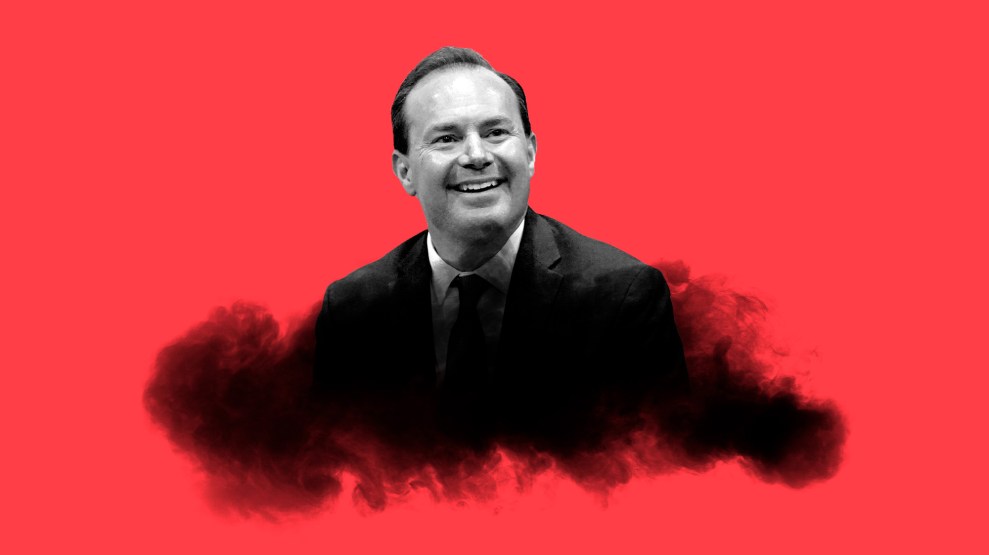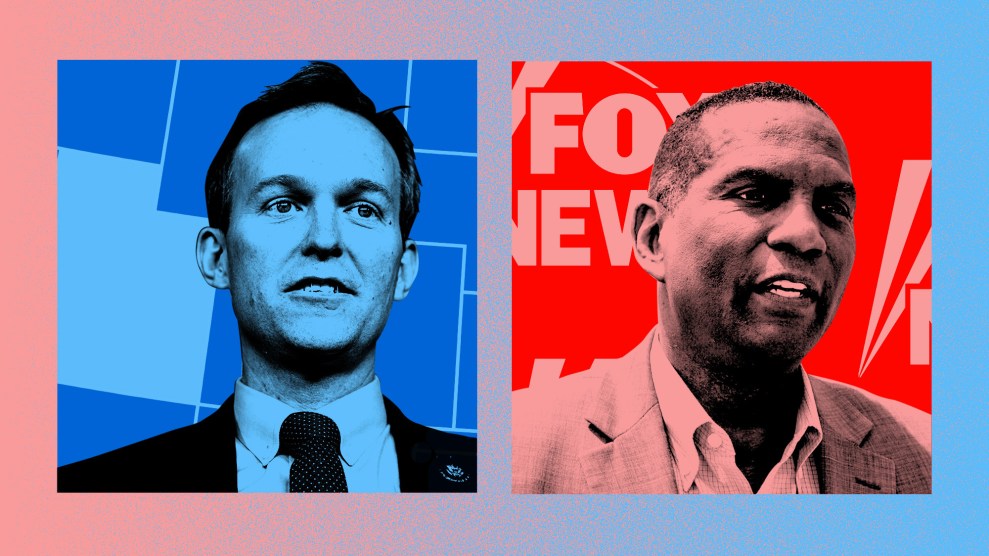On a rainy night in February, about 50 conservatives squeezed into a room at the Taylorsville Heritage Center to hear from several candidates running for office in Utah this year. The MAGA-friendly crowd had been organized by “rapping granny” Linda Paulson, the octogenarian great-grandmother who had earned 15 minutes of viral fame in 2022 by announcing her unsuccessful state Senate campaign with a cringy video in which she rapped her opposition to transgender athletes and critical race theory.
Among the night’s headliners was Trent Staggs, the 49-year-old part-time mayor of Riverton, population 45,000, who is running to succeed Mitt Romney in the US Senate by appealing to these vocal and motivated grassroots right-wing voters. Clean-cut and slender, wearing jeans, a blue blazer, and a button-down shirt with no tie, Staggs looked like a cross between a hedge-fund manager and the Mormon missionary he once was.
Staggs kicked off his speech by talking about his accomplishments as Riverton mayor. He lured a new Costco to his Salt Lake City suburb, for instance, and stood “up to high-density housing.” He introduced his wife, who coached the local high school drill team for 16 years. Despite the nod to his municipal service, Staggs was not there to lay out a unique vision for serving the people of Utah. He was there to demonstrate his ultra-MAGA bona fides. “It’s very simple: If you want another Mitt Romney, don’t vote for me,” Staggs explained to the crowd. “If you want another Mike Lee, I’m your guy.” He was referring to the state’s other US senator, the one who tried to help Donald Trump find a legal basis for overturning the 2020 election results.
In the spring of 2023, Staggs made headlines as the first candidate to officially challenge Utah’s junior senator, who had not yet announced his retirement. The former GOP presidential candidate had become a national hero in some quarters for bucking his party to vote to impeach Donald Trump, but Romney had become increasingly unpopular at home.
Staggs’ early attack on Romney caught the attention of MAGA world, which launched him onto the right-wing media circuit. The telegenic mayor appeared on Newsmax and Mark Levin’s Rumble show. One of Trump’s lawyers, Harmeet Dhillon, donated $1,000 to his campaign. Staggs was on a roll—and virtually alone in the race—until Romney announced his retirement in September.
Romney’s decision not to run for a second term triggered a political free-for-all. Ten more people eventually jumped into the GOP primary—everyone from first-time candidate Brent Orrin Hatch, son of the late seven-term Utah senator, to Jason Walton, the CEO of a pest control company, to former piano tuner and current gold salesman Jeremy Friedbaum. (One has since dropped out.) The field will be winnowed on April 27, when the state Republican Party holds its nominating convention, but of Utah’s idiosyncratic nominating system, the June statewide primary ballot will still have at least four and as many as six GOP candidates for voters to choose from.
Staggs is by far the most MAGA of the bunch, and the least fringy of the pro-Trump candidates. His campaign is working off a well-established script that has involved courting a cast of familiar national far-right actors to raise his profile far beyond the strip malls of Riverton, Utah, and into the national conversation. In February, he made the pilgrimage to Trump’s Florida resort, Mar-a-Lago, where Trump advisers Kash Patel and Roger Stone hosted a fundraiser for him organized by some of the club members.
View this post on Instagram
He’s been endorsed by a string of national right-wing luminaries, including podcaster and former Trump Treasury official Monica Crowley, Ric Grenell, Trump’s acting director of national intelligence in 2020, and Arizona Senate candidate Kari Lake, who hosted a private fundraiser for him in Utah in September. Alabama Sen. Tommy Tuberville campaigned for him in March. Rep. Matt Gaetz (R-Fla.), who calls himself the “Trumpiest congressman,” headlined a rally for Staggs on March 28; Turning Point USA’s Charlie Kirk joins him this week. And Staggs just scored the endorsement of failed GOP presidential candidate Vivek Ramaswamy after signing his “American Truth Pledge,” which commits him to, among other things, seeking a 75 percent reduction in the size of the federal government and mandating that all high school seniors pass a civics test in order to vote.
“I’m not just somebody going out there trying to pick up any old endorsement,” Staggs told the Salt Lake Tribune. “These are intentional. These are folks that I want to be able to say I’m going to emulate their type of fire and energy and ability to push back against the establishment.”
A few weeks after the event in Utah, I ran into him at the Conservative Political Action Conference in Washington, DC, the oldest and largest annual gathering of conservatives in the country. He was there to speak on the main stage that would later host Trump himself. I asked him if he was reaching a lot of Utah voters at the Beltway-adjacent conference. “That’s the great thing about CPAC,” he said, looking briefly flummoxed. “It broadcasts everywhere!”
There’s little in his platform that might distinguish Staggs from any other MAGA candidate this year. “As Senator, I will be woke’s worst enemy,” he declares on his campaign website, which highlights his requisite opposition to the “invasion at the border,” “ESG,” the “weaponization” of federal agencies, and the existence of the US Department of Education.
It’s not the first time Utah has seen this sort of nationalized campaign. Consider the case of Rep. Burgess Owens, a former NFL player and Fox News commentator with virtually no ties to the state. Owens, who has filed for bankruptcy five times, didn’t even appear to own a house in the state and had shown a shocking lack of familiarity with specific Utah concerns. But none of that seemed to matter to the Fox News voters when he ran for a US House seat in 2020 and knocked off incumbent Democrat Rep. Ben McAdams, a seventh-generation Utahan who was the last Democrat in the state’s congressional delegation. Owens is up for reelection this year and virtually unchallenged.
Like Owens four years ago, Staggs has strikingly little to say about issues specific to his home state beyond his rote commentary on wokeness and the national debt. After he finished speaking in Taylorsville in February, I asked him what should have been a softball question for someone in the Senate race for almost a year: What do you see as the federal role for saving Great Salt Lake?
The famous lake, less than 40 miles from Staggs’ town, is drying up and creating toxic dust clouds. If things continue as they are, that dust will eventually destroy the famous mountain snowpack and make the Salt Lake Valley uninhabitable. It’s one of the most pressing issues, if not the most pressing, facing the state right now. The lake crisis has been the focus of nonstop meetings, public forums, investigative stories, and legislative action over the past two years. Even Utah Sen. Mike Lee, not one for caring about the environment, has a proposal for the lake, albeit a perplexing one, which is to build more dams.
Yet when I asked Staggs about Great Salt Lake, he replied somewhat sheepishly, “I probably need to study that issue a little more,” while offering a variation on the popular “pray for rain” deflection deployed by many state officials. Perhaps if Utah has a few more seasons of wet weather like it’s had this past year, he suggested, the Great Salt Lake “takes care of itself.”
Surrounded by pioneer memorabilia and other tchotchkes inside the Taylorsville Heritage Center, Staggs explained his early decision to challenge an incumbent senator. “I was very disappointed with Mitt Romney. It’s incredibly frustrating. I mean, he’s one of the five Republicans that even confirmed [Alejandro] Mayorkas,” he said, a reference to Biden’s Homeland Security secretary who conservatives blame for the border crisis that drew boos from the crowd. “That clown needed to be impeached a long time ago.”
But Staggs hasn’t always been so down on Romney—or even such a MAGA partisan. His transformation is recent and clearly inspired by people like Matt Gaetz, who was one of the first MAGA celebrities to leverage right-wing media and Trump’s coattails to launch himself out of a political backwater and onto the national stage.
A graduate of the University of Utah, with an MBA from Brigham Young University, Staggs once reflected the sort of polite, Utah-style, moderate Republican views he is now attacking on the campaign trail. As Riverton’s mayor, he used to talk about the need to address Salt Lake’s chronically bad air quality and focus on sustainable development and public transportation. He created a diversity and inclusion committee at the request of a Venezuelan asylum seeker in his town.
One of nine children, Staggs is a member of the state’s dominant LDS church and served as a missionary in Tahiti—he learned both French and Tahitian for the work—an experience that gives him a far more global perspective than he likes to admit these days as he loudly opposes aid to Ukraine in media appearances.
Staggs honed his networking skills as a veteran of Utah’s most prominent home-grown industry: multi-level marketing, a business that also gave the state former Rep. Jason Chaffetz (R), now a Fox News contributor. Otherwise known as legalized pyramid schemes, MLM companies often purport to sell “natural” dietary supplements (another Utah specialty), skin care products, or weight-loss remedies.
In 2015, while serving on the Riverton city council, Staggs became the president of Regeneca, an MLM company that sold herbal remedies with names like RegenErect and RegeneArouse that promised to cure erectile dysfunction. Before his tenure with the company, back in 2012, the FDA had forced Regeneca to recall its “natural” erectile dysfunction dietary supplement after discovering that it contained the prescription drug tadalafil, otherwise known as Cialis.
Then in 2017, the FDA ordered the company to recall all the products it had produced since 2011 after finding many of the supplements were adulterated, including some weight loss products that contained an amphetamine derivative that can cause heart attacks. “All of these issues, which predated my arrival, are exactly why they brought me into the company as interim president,” Staggs told DailyMail.com in a March statement. “The owners needed someone to evaluate the business and see if there was a path forward.” There was not. The Justice Department took a civil enforcement action against the company that effectively shut it down.
After four years on the Riverton city council, Staggs was elected the town’s mayor in 2017, but he clearly had bigger things in mind. In 2020, he ran for Salt Lake County mayor, a job that had helped launch a previous occupant, Ben McAdams, into Congress. During that race, Staggs happily touted Romney’s endorsement. “In a time of divisive, partisan politics in Washington, DC, Senator Romney has a heavy burden and we’re thankful for his dedicated service,” he said in a statement at the time. “We’re grateful for his support and vote of confidence in our efforts to lead Salt Lake County as an example of good governance, fair representation, and statesmanship.”
Not even a good word from Romney could push Staggs over the finish line, however. Democrat Jenny Wilson beat him by more than 10 points. “I think that he has more ambition than he has substance,” observes Tim Chambless, Staggs’ former political science professor at the University of Utah. “He’s not oriented as a problem solver, as a policy wonk. Jenny Wilson beat him for a reason. She knew the issues that impacted Salt Lake County.”
Staggs’ focus on securing all the high-profile MAGA endorsements and campaigning at Mar-a-Lago and CPAC may have limited value in the June primary. “A lot of those people don’t vote in Utah,” observes the University of Utah’s Chambless. Staggs may be a popular right-wing media guest these days, but after nearly a year on the campaign trail, a January Deseret News/Hinckley Institute of Politics poll found that only 3 percent of likely voters supported him.
Those low numbers may not matter, however. In fact, because of Utah’s outdated electoral system and the many candidates vying for the open seat, Staggs has a much better shot at becoming the state’s next senator than mayor of Salt Lake County. With about 1.2 million residents, Salt Lake County is the state’s largest, and it’s far more liberal than the rest of the state. In 2020, Joe Biden won Salt Lake County at the same time Trump carried the state by more than 20 points. Because Utah’s extra-red rural areas simply don’t have enough voters to carry him through, Staggs, in theory, still needs a good chunk of those Salt Lake residents to win the statewide Senate race. But here’s where his campaign strategy may work in his favor.
In the past, the only way to get on the Utah primary ballot was for a candidate to win the votes of at least 40 percent of the delegates to a party’s annual convention. In 2010, Sen. Mike Lee was able to knock off moderate Republican incumbent Robert Bennett this way by tapping a faction of angry tea party delegates in a surprise upset. (Bennett came in third at the convention, thus losing his seat.)
GOP convention delegates are far more extremist than the average Utah voter. They famously booed Romney during his speech at the 2021 state GOP convention. In 2014, the state legislature changed the law so that candidates can now circumvent the conventions and get on the June primary ballot by submitting petition signatures—a minimum of 28,000 of them for a US Senate race. That’s what Romney did in 2018, when he lost at the GOP convention, but went on to win the statewide primary with more than 70 percent of the vote.
Staggs, by contrast, is campaigning to win a place on the ballot solely through delegates to the April 27 convention. As a result, his campaign is narrowly focused on the hard-core MAGA extremists. If he can win 40 percent of the 4,000 or so convention delegates—about 1600 votes—he will advance to the June 25 statewide primary ballot. “We’re not a runoff state here in the state of Utah. It can be won with a plurality,” Staggs explained in an interview on OANN this month. “I think it’s a once-in-a-generation opportunity to have the most conservative wing of our party here in the state go ahead and select this senator because with a plurality, we can win it.”
He’s not wrong. Three candidates have already secured enough signatures to win a spot on the June ballot: Rep. John Curtis and former Utah House Speaker Brad Wilson, relative moderates viewed as potential Romney heirs, and Jason Walton, the pest control executive who fancies himself an outsider businessman like Trump. As of Wednesday evening, Brent Hatch still had not secured enough certified signatures to get on the ballot, despite his famous father and a pile of outside money flowing into the race on his behalf. The Conservative Outsider PAC has so far spent at least $1.8 million supporting his candidacy. Federal Elections Commission filings indicate that all $2 million raised by the PAC in this cycle came from another conservative PAC, the Club for Growth Action. (After this story published, a spokesman for the group emailed Mother Jones to say it “has not made an endorsement and Club for Growth Action has not engaged in the race. Club for Growth Action has made contributions to Conservatives Outsider PAC, but we do not direct their independent expenditures.”) Hatch will still participate in the convention.
Staggs is popular among GOP delegates. He won a March straw poll of 425 GOP delegates in Washington County, which encompasses the rapidly growing conservative stronghold around St. George in southern Utah, with more than 30 percent of the vote. And last week he won a similar straw poll in Uintah County in the eastern part of the state. If he’s one of the top two finishers at the convention, it’s entirely possible Staggs could go on to win the GOP primary in June with barely more than 20 percent of the statewide vote.
In theory, the GOP nominee could lose in November to a Democrat—in this case, the presumptive nominee is Caroline Gleich, a professional ski mountaineer and climate activist. But Utah, where Republicans outnumber Democrats four to one, has not sent a Democrat to the Senate since 1970, despite the LDS church’s recent efforts to convince its members that voting for a Democrat is not a sin. “Merely voting a straight ticket or voting based on ‘tradition’ without careful study of candidates and their positions on important issues,” the church hierarchy instructed in a letter last year, “is a threat to democracy and inconsistent with revealed standards.”
The race’s presumed frontrunner is Rep. John Curtis, a popular former mayor of Provo and one-time Democrat who has represented Utah’s third congressional district since 2017. A late entry, he didn’t declare his candidacy until January, after saying last year he wouldn’t run. The founder of the House Conservative Climate Caucus, Curtis has tried to get Republicans to focus on clean energy policy.
The state’s MAGA activists suspect Romney and other establishment Republicans persuaded Curtis to run. But many convention delegates see him as far too moderate. During a candidate forum this month hosted by the conservative Utah Eagle Forum, Curtis addressed the 300 or so GOP convention delegates through a prerecorded message because the House was still in session. When the video started, people booed and some demanded that it be turned off.
Nonetheless, the disconnect between the convention delegates and the rest of the state’s Republican voters showed up in the January Deseret News poll, which found the sitting congressman winning 18 percent of likely primary voters. But the poll also showed that the race is still very much in the air, with more than half the respondents saying they “didn’t know” who they’d be voting for.
According to the most recent campaign finance filings released this month, Curtis has raised more than $3 million, including some funds he carried over from his House reelection fund. His campaign has also been bolstered by outside expenditures from the Conservative Values for Utah super-PAC, which is largely funded by one man: Jay Faison, a conservative North Carolina philanthropist who claims to want to accelerate a transition to clean energy by supporting nuclear power, natural gas fracking, and carbon-capture technology. The super-PAC has spent nearly $3 million on Curtis’s behalf.
In contrast, Staggs doesn’t have that kind of financial support or deep pockets to self-fund his campaign, like former Utah House Speaker and real estate developer Brad Wilson, who’s loaned his own campaign $3 million; or pest control CEO Walton, who’s loaned his campaign $2.5 million. Staggs has raised just under $1 million, including the $90,000 he loaned the campaign, a budget that also helps explain his thrifty strategy of focusing on just a handful of convention delegates.
Staggs clearly sees Curtis as his biggest rival. At the February event in Taylorsville, he attacked the congressman for being insufficiently loyal to Donald Trump, whose endorsement he is desperately courting. “I was the very first one to come out and endorse President Trump. I did it last summer, in an op-ed in The Washington Times,” he told the group. “We’ve got one candidate in this race, John Curtis, that still refuses to endorse President Trump.”
When Rep. Matt Gaetz appeared with Staggs at Riverton High School last month, he also took potshots at his House colleague. “John Curtis is Mitt Romney without good hair,” Gaetz said, receiving predictable laughs. After the event, Staggs basked in the endorsement of the man who recently led the charge to topple House Speaker Kevin McCarthy (R-Calif.) and who is reportedly plotting to run for governor of Florida. The Gaetz endorsement is about as close to one from Trump as he’s likely to get ahead of the GOP convention on Saturday. Whether it will help him get elected is anyone’s guess, but if not, the Riverton mayor has already set himself up for the next best thing: a new career as a talking head on the right-wing media circuit.
Correction, April 24: An earlier version of this story misstated the name of the PAC supporting Brent Hatch. It has been updated to clarify and include a comment from the Club for Growth.
















